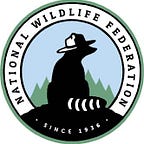Wild Places Should Remain Wild
David Willms is the senior director of Western wildlife and conservation for the National Wildlife Federation. He is a passionate hunter, angler, backpacker and father to three young children. He also hosts the Your Mountain podcast.
A loud snort outside the tent jolted me awake. Without leaving my sleeping bag I quietly unzipped the vestibule and peered in the direction of the sound. Cast against the backdrop of a full moon, and not more than six feet away, stood a large animal whose brilliant white coat, muscular build, and jet-black horns left no doubt as to its identity.
Seeing mountain goats in the high country of the Absaroka-Beartooth Wilderness in Montana is common, and we saw several that day. However, this middle of the night encounter was different. For more than an hour, the mountain goat explored our camp — leaving clumps of his winter coat on everything he touched. On more than one occasion, he drifted so close to my open tent that I could feel his breath on my face. It is an experience I will remember forever, yet only one of many intimate wildlife encounters I have enjoyed over my years exploring the far reaches of our country’s public lands.
Five years ago, I watched a dozen grizzly bears overturn boulders high in the mountains of the Washakie Wilderness in Wyoming searching for Army cutworm moths — an important food source. Two years ago, a pack of wolves wandered into my camp in the Bridger Wilderness, and serenaded me to sleep. Earlier this year in the Comanche Peak Wilderness in Colorado, my daughter and I watched a pine marten diligently excavate a shelter from a standing dead spruce tree.
These experiences provide more than great memories. They provide fuel for future adventures. They teach the values of hard work, patience, perseverance, and humility. They affirm a foundational principle that wild places should remain wild. Perhaps most importantly, they instill a reverence for those who came before us.
I am forever grateful to the scores of leaders with the foresight and unwavering conviction to reserve for the public nearly one third of our nation’s land. It stands as one of our greatest conservation achievements. Their leadership ensures intact habitat, thriving wildlife populations, and that my family’s lives are enhanced beyond measure.
…………………………………………………………………………………….
So many of our country’s parks and public lands written about in these love notes would not exist but for the Land and Water Conservation Fund (LWCF). This important conservation program was permanently funded when Congress signed the Great American Outdoors Act earlier this summer. You can learn more about the Land and Water Conservation Fund here.
Would you like to write about public lands that you cherish? Please email Mary Jo Brooks at brooksm@nwf.org for guidelines.
